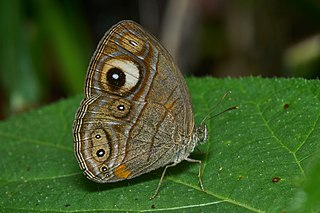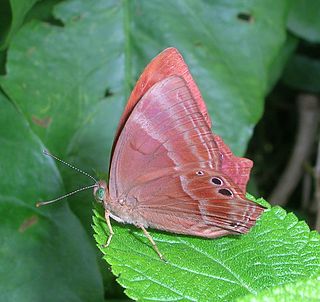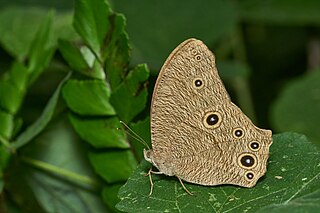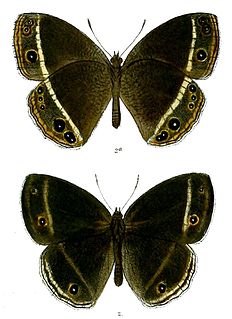
Mycalesis patnia, the glad-eye bushbrown, is a satyrid butterfly found in southern India and Sri Lanka.

Mycalesis oculus, the red-disc bushbrown, is a satyrine butterfly found in southern India. It is similar in markings to Mycalesis adolphei but distinguished by the reddish band around the large apical spots on the upper forewings.

Abisara echerius, the plum Judy, is a small but striking butterfly found in Asia belonging to the Punches and Judies family (Riodinidae). It is difficult to distinguish it from Abisara bifasciata.

Melanitis leda, the common evening brown, is a common species of butterfly found flying at dusk. The flight of this species is erratic. They are found in Africa, South Asia and South-east Asia extending to parts of Australia.

Abisara fylla, the dark Judy, is a small but striking butterfly found in India that belongs to the Punches and Judies, that is the family Riodinidae.

Appias lalage, the spot puffin, is a small butterfly of the family Pieridae, that is, the yellows and whites, which is found in India, Indochina and Hainan.

Appias indra, the plain puffin, is a small butterfly of the family Pieridae, that is, the yellows and whites, which is found in south and southeast Asia.

Mycalesis perseus, the dingy bushbrown or common bushbrown, is a species of satyrine butterfly found in south Asia and southeast Asia.

Symbrenthia lilaea, the peninsular jester, is a species of nymphalid butterfly found in South Asia and Southeast Asia. It forms a superspecies with Symbrenthia hippoclus. There are numerous regional forms, and the taxonomy of the group is not well resolved.

Mycalesis mineus, the dark-brand bush brown, is a species of satyrine butterfly found in Asia.

Mycalesis subdita, the Tamil bushbrown, is a satyrine butterfly found in south India and Sri Lanka. It is not resolved whether this is a good species or is a subspecies of Mycalesis visala.

Mycalesis mestra, the white-edged bushbrown, is a species of satyrine butterfly found in Asia
Mycalesis nicotia, the brighteye bushbrown, is a species of satyrine butterfly found in Asia.

Junonia almana, the peacock pansy, is a species of nymphalid butterfly found in Cambodia and South Asia. It exists in two distinct adult forms, which differ chiefly in the patterns on the underside of the wings; the dry-season form has few markings, while the wet-season form has additional eyespots and lines.It is listed as Least Concern in the IUCN Red List.

Athyma nefte, the colour sergeant, is a species of brush-footed butterfly found in tropical South and Southeast Asia.

Ypthima baldus, the common five-ring, is a species of Satyrinae butterfly found in Asia.

Ypthima huebneri, the common fourring, is a species of Satyrinae butterfly found in Asia.

Melanitis phedima, the dark evening brown, is a species of butterfly found flying at dusk. The flight of this species is erratic. They are found in south and southeast Asia.

Vindula erota, the common cruiser, is a species of nymphalid butterfly found in forested areas of tropical South Asia and Southeast Asia.

Ypthima striata, the Nilgiri jewel fourring or striated fivering, is a species of Satyrinae butterfly found in south India.




















